by Derek Davison
On February 27 gunmen seized control of government buildings in the Autonomous Republic of Crimea in Ukraine and raised a Russian flag over the headquarters of the Crimean Parliament in the regional capital Simferopol. This began a series of events that has resulted in Crimea under Russian control and furious diplomatic efforts underway between Ukraine, the European Union, the United Nations, NATO, Russia, and the United States. This primer will offer some background to the (rapidly changing) events currently taking place in Ukraine and some idea as to where things may proceed from here.
What is Crimea and why is it important to Russia?
Crimea is a peninsula that extends from the southern part of Ukraine into the Black Sea. Formerly controlled by the Crimean Khanate (whose Tatar subjects were forcibly relocated out of the peninsula by Josef Stalin in 1944), it was annexed into the Russian Empire in 1783 and immediately became home to Russia’s Black Sea naval fleet, based in the southern city of Sevastopol. The fleet was sunk during the Crimean War (1853-1856) when Sevastopol was besieged by a combined French, British, and Ottoman army, but was rebuilt after the war. In 1921 Crimea became the Crimean Autonomous Soviet Socialist Republic, part of the Russian Soviet Federative Socialist Republic, but in 1954, it became part of the Ukrainian Soviet Socialist Republic to streamline post-WWII reconstruction. Crimea briefly declared self-government when the Soviet Union collapsed in 1992, but agreed to remain part of the newly independent Ukraine.
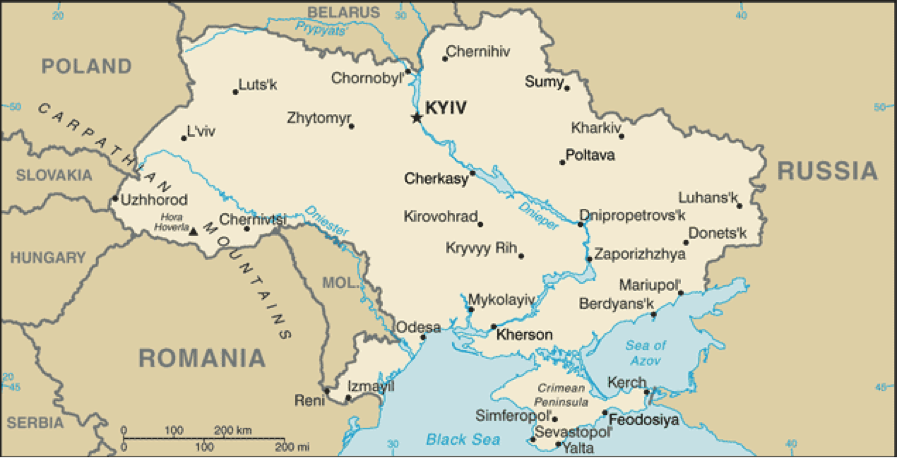 Ukraine, including Crimea to the south (Credit: CIA World Factbook)
Ukraine, including Crimea to the south (Credit: CIA World Factbook)
All of Ukraine has value to Russia, but Crimea is especially important. Crimea has only been part of an independent Ukraine for 20 years, a fraction of the time it was part of Russia, and ethnic Russians are actually almost 60% of the peninsula’s population, according to the most recent census (2001). More crucially, the Russian Black Sea Fleet is based at Sevastopol, part of a post-Soviet deal between the two countries to divide the former Soviet fleet and to lease part of the base to Russia, and so Russia has military/strategic reasons to ensure that it retains access to that base.
Why did Russian forces invade Crimea now?
Beginning in late-November 2013, a series of protests, known as Euromaidan, began in the Ukrainian capital, Kiev, against the government of then-President Viktor Yanukovych, a close ally of Russian President Vladimir Putin. Dueling pro- and anti-government protests, and clashes with security forces, continued through January 2014, when the Yanukovych government announced new draconian anti-protest laws. What had been an occasionally violent protest movement turned into a full-blown revolution, culminating in a series of clashes on February 18-20. Casualty reports vary, but as many as 100 people may have been killed in the violence.
On February 21, Yanukovych reached a deal with opposition leaders to end the violence, but the protesters refused to accept it, and the following day Yanukovych fled Kiev. Yanukovych has been impeached and removed from office by the Ukrainian Parliament, an act that he rejects, and is considered a fugitive for his role in the deadly February violence. After Yanukovych was impeached, officials in Putin’s government suggested that the Russian military could intervene in Ukraine if it was deemed necessary in order to “protect” Crimea. On March 1, the Federation Council, the upper house of the Russian Parliament, voted unanimously to give Putin authority to deploy Russian troops into Ukraine, and the Russian military seized near-total control of Crimea.
What were the Ukrainian protests about?
Ukraine’s economy has been in crisis for some time. Many Ukrainians supported the adoption of an Association Agreement with the European Union as a way to boost the economy, but Yanukovych’s government suspended talks over the proposed agreement and instead pursued entry into the Eurasian Customs Union, alongside Russia, Belarus, and Kazakhstan. Polls indicated that a slim plurality of Ukrainians favored the EU deal over the customs union. The name of the protest movement, “Euromaidan,” reflects its initial demand (closer integration with Europe) and the fact that it began in Maidan Nezalezhnosti (“Independence Square”) in downtown Kiev.
The dispute over whether to gravitate toward Europe or back toward Russia exacerbated an already existing ethnic and linguistic split between the largely Ukrainian, pro-Europe western half of the country and the more Russian-oriented eastern half. But this division has been overemphasized as a “cause” of the protests, when the principal causes were Ukraine’s weak economy and Yanukovych’s decisions to reject the EU and then try to violently suppress the initial protests. Even in the eastern, “pro-Russian” part of Ukraine, the majority of the population is ethnic Ukrainian and, according to a 2011 poll, a majority in every province (even Crimea) sees Ukraine as its mother country.
Does Russia have designs on the rest of Ukraine?
The Federation Council resolution authorizing Russian military intervention in Ukraine pointedly allows deployment anywhere in Ukraine, not just Crimea. There are several reasons why Russia wants to retain influence in all of Ukraine, if not to outright control it. Russian history and national pride is inextricably tied to Ukraine, since Russians trace their origins to the 9th-13th century Rus’ people, whose capital and principle city was Kiev. Economically, it would be a blow to Russia if Ukraine were to choose EU membership over joining the Eurasian Customs Union, and Russia also depends on Ukrainian pipelines to ship its natural gas to the rest of Europe. Pro-Russian protests have taken place in eastern Ukrainian cities outside of Crimea, with Russian flags also being raised in several places there.
On the other hand, Russia continues to deny that it has even sent troops into Crimea, let alone the rest of Ukraine, since the fighters who have taken control of Crimea appear to be Russian private paramilitaries rather than official Russian soldiers.
Do the Crimeans want (or need) Russian “protection”?
It does seem that Crimean Russians, worried that the new government in Kiev might be hostile to them, have welcomed the arrival of Russian troops. New Crimean Prime Minister Sergey Aksyonov refused to recognize Yanukovych’s removal from office and asked Putin to send Russian forces to help him “ensure peace” in Crimea. It is worth noting that one of the first acts of the new Ukrainian government was to abolish a 2012 law allowing Russian to be used as a second official language in some parts of the country (interim Ukrainian President Oleksandr Turchinev vetoed that effort), and it is also true that the Euromaidan movement included some far-right Ukrainian nationalist groups. However, Crimea is also home to large populations of ethnic Ukrainians and Tatars (who started returning to Crimea after the fall of the USSR), and these groups do not support the Russian invasion.
How have Ukraine and the rest of the world responded to Russia’s invasion?
The Ukrainian government has mobilized its military, though it seems to be on a purely defensive posture. At the UN Security Council, the United States and Ukraine accused Russia of violating Ukraine’s sovereignty, in particular the 1994 Budapest Memorandum in which the US, UK, and Russia pledged to honor Ukraine’s territorial integrity. Russia has countered that American and European involvement in Euromaidan (an accusation for which it has yet to produce any evidence) was itself a violation of Budapest and made Russian intervention necessary. Presidents Barack Obama and Putin held a “testy” phone conversation in which Putin asserted Russia’s right to defend ethnic Russians in Ukraine, while Obama called on Putin to draw his forces back. There are diplomatic levers that the US and the EU can push, including sanctions against Russia and Russian politicians, but there is likely nothing powerful enough to force Putin to withdraw. Kiev has options it can pursue as well; Crimea is, for example, dependent on the mainland for its water and electricity, and while Ukraine relies on Russia for its natural gas, Russia also relies on Ukrainian pipelines to get that gas to European markets, so Putin cannot punish Kiev by just turning the gas off. Still, these options are unlikely to force Russia to withdraw.
Russia may simply order its forces out of Crimea after extracting concessions from Kiev, something akin to the outcome of the Russia-Georgia War in 2008, but it is possible that Putin will attempt to carve eastern Ukraine and Crimea off into a new state, which could lead to a military confrontation.

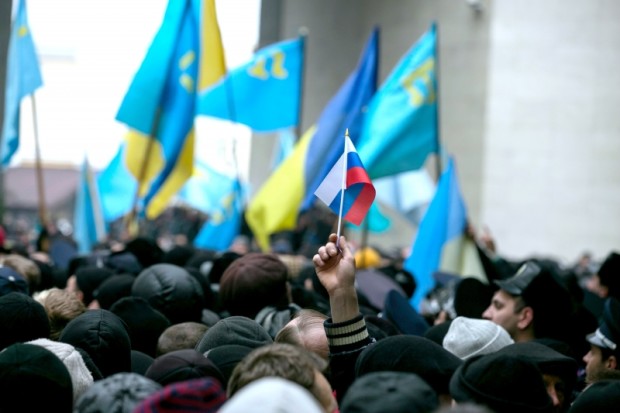
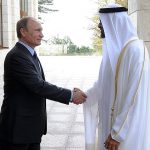
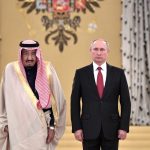
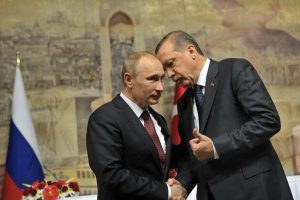
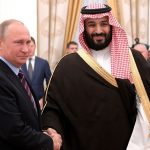
Who’s running the show? Careful who has the finger on the button. Considering the outcome of the various intrusions that NATO and the U.S. has engaged in so far, it’s a safe bet that the peoples in the Ukraine will be the ones caught in the middle, suffer possibly with death & destruction of their country if the shooting starts, while the instigators puff up their chests and rant. Isn’t it time to bring back the draft here in the U.S., considering that the rightwing warmongers seem to be getting their way? And who will back Israels play if it decides to fly in to help the Ukrainian Jew?
Mr Davison is telling only 1/3 of the story; Victoria Nuland’s tapped phone conversation reveals the US role in this new “Mossadeqh” gambit, and the presence of (former) IDF troops as leaders of Ukrainian “protesters” suggests another element involved. The latter, coupled with the fact that Putin is attempting to wrest control of Russia’s finances from Israeli-linked oligarchs, PLUS the repeated declarations of USA-based ex-diplomats who seek to cover up the role of Nuland and her “Kermit Roosevelt,” Jeff Feltman at United Nations, while insisting on the readiness of IMF to extend loans to Ukraine, suggests (no, not suggests, SCREAMS) that the goal of this entire affair was a collusion between USA and EU to “liberate” Ukraine from its currency and place it firmly in the orb of central banksters.
Whatever the outcome, the people of Ukraine are going to loose. USA — certainly not the Nuland-Graham-McCain-Netanyahu-AIPAC elites at the top of US foodchain — do not care a fig who gets hurt and how badly, as long as they gain control of Ukrainian resources and wrest from Putin and Russia any little bit of US superpower hegemony.
Putin is threatening US superpower hegemony/imperial dominance.
I for one think that Russia placing a bit more weight on the opposite side of unipolar dominance is a good thing. USA is out of control. Russian counterweight can cool USA jets nonviolently, if such is allowed to take place. That would require that the Nuland faction be fully exposed to the US public.
What if some Russian equiv. of secretary of state were to gloat and cackle, “We came, We saw, She died,” as video of Nuland being Qaddafied were flashed all over the globe?
The author suggests that it is only Russia who has some designs on the rest of Ukraine. It would be ok if it was true. He implies that Russians words about US/EU designs are actually not documented. In my opinion one needs to remember intercepted words of secretary of State department Victoria Nuland to US ambassador in Kiev to see there definitely were US/EU designs on the Ukraine.
In another paragraph author says outright lie about the official languages law in Ukraine. This law from 2012 was abolished by “revolutionary” parliament as the first legislative act of it after fascists from Maidan took the power. It is true that interim president Oleksandr Turchinev 5 days later (after especially EU politicians persuaded him) he vetoed this act. However the fact that it was the very first act of revolutionaries after getting the power does not show very well for Russian minority in Ukraine and they have every right to feel in danger.
Let’s step back and examine this new “government” in Ukraine.
Who are they? Do they have legitimacy? What about these “neo-nazis” having a prominent role in this government and being given control over the police and security.?
And what about those reports about anti-Semitism? There’s a history there.
A French priest, Father Patrick Desbois, has made it his life’s work to uncover Ukraine’s WWII past.
@Solon
Your foil cap is not having the intended effect.
I suggest that you take your copy of the Protocols and lie it flat across your cranial ridge.